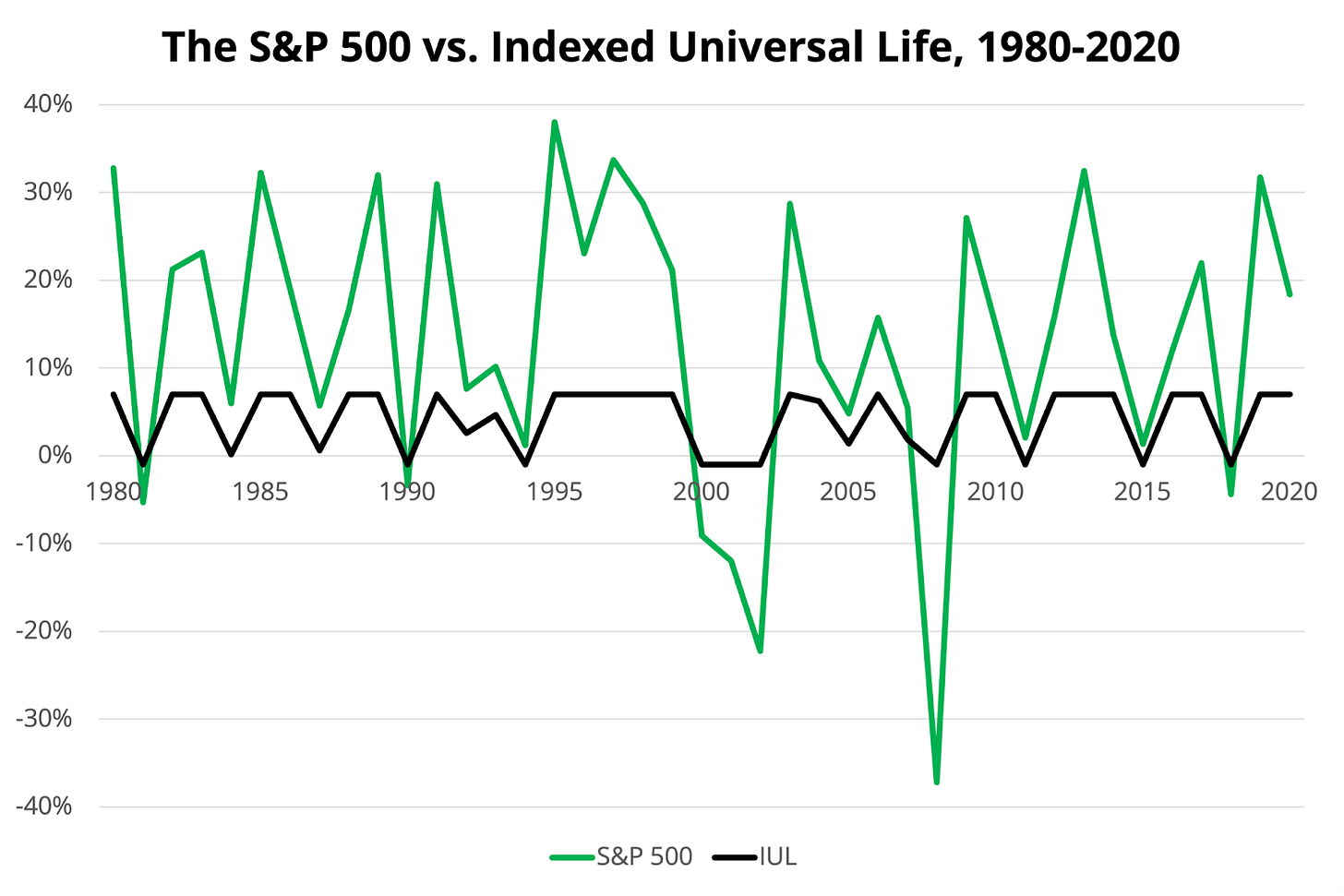All Categories
Featured
Table of Contents
1), frequently in an attempt to beat their category averages. This is a straw man debate, and one IUL people like to make. Do they contrast the IUL to something like the Vanguard Overall Stock Exchange Fund Admiral Shares with no tons, an expenditure proportion (EMERGENCY ROOM) of 5 basis factors, a turn over ratio of 4.3%, and a remarkable tax-efficient document of distributions? No, they contrast it to some horrible proactively taken care of fund with an 8% tons, a 2% EMERGENCY ROOM, an 80% turnover ratio, and a dreadful document of short-term funding gain distributions.
Common funds usually make yearly taxable circulations to fund proprietors, also when the value of their fund has actually dropped in worth. Mutual funds not only need income reporting (and the resulting annual taxation) when the common fund is rising in worth, yet can also enforce earnings taxes in a year when the fund has actually dropped in value.
You can tax-manage the fund, collecting losses and gains in order to lessen taxable circulations to the investors, but that isn't in some way going to alter the reported return of the fund. The ownership of mutual funds might need the mutual fund owner to pay projected tax obligations (universal life 保险).

IULs are easy to position so that, at the owner's fatality, the beneficiary is exempt to either earnings or estate taxes. The same tax obligation decrease methods do not work almost as well with common funds. There are many, typically pricey, tax obligation traps associated with the moment trading of common fund shares, traps that do not put on indexed life Insurance coverage.
Possibilities aren't very high that you're going to be subject to the AMT due to your shared fund distributions if you aren't without them. The remainder of this one is half-truths at best. While it is real that there is no revenue tax due to your heirs when they inherit the proceeds of your IUL policy, it is likewise real that there is no income tax obligation due to your heirs when they inherit a shared fund in a taxable account from you.
Pros And Cons Of Indexed Universal Life Insurance
There are much better means to avoid estate tax concerns than purchasing financial investments with reduced returns. Mutual funds may trigger revenue tax of Social Security advantages.

The development within the IUL is tax-deferred and might be taken as tax free revenue via fundings. The plan proprietor (vs. the mutual fund manager) is in control of his/her reportable revenue, thus allowing them to reduce or also get rid of the taxation of their Social Protection advantages. This one is great.
Here's one more minimal issue. It's true if you buy a shared fund for state $10 per share prior to the circulation date, and it disperses a $0.50 distribution, you are after that going to owe taxes (probably 7-10 cents per share) regardless of the truth that you have not yet had any gains.
In the end, it's actually regarding the after-tax return, not how much you pay in tax obligations. You are mosting likely to pay even more in tax obligations by utilizing a taxable account than if you acquire life insurance policy. But you're also possibly mosting likely to have more money after paying those taxes. The record-keeping needs for having common funds are dramatically more complicated.
With an IUL, one's documents are maintained by the insurance policy firm, duplicates of yearly declarations are sent by mail to the owner, and circulations (if any) are amounted to and reported at year end. This set is also type of silly. Naturally you need to maintain your tax obligation documents in case of an audit.
Universal Underwriters Life Insurance
All you need to do is shove the paper into your tax obligation folder when it reveals up in the mail. Rarely a factor to get life insurance policy. It's like this individual has never ever purchased a taxed account or something. Shared funds are generally component of a decedent's probated estate.
On top of that, they go through the hold-ups and expenses of probate. The earnings of the IUL policy, on the various other hand, is always a non-probate distribution that passes outside of probate directly to one's named recipients, and is for that reason exempt to one's posthumous creditors, unwanted public disclosure, or comparable delays and costs.
Medicaid disqualification and lifetime revenue. An IUL can offer their proprietors with a stream of earnings for their whole lifetime, no matter of just how long they live.

This is useful when organizing one's events, and transforming possessions to earnings prior to a retirement home arrest. Mutual funds can not be converted in a comparable way, and are generally thought about countable Medicaid possessions. This is an additional stupid one supporting that bad individuals (you recognize, the ones who need Medicaid, a federal government program for the inadequate, to spend for their assisted living home) ought to utilize IUL rather of mutual funds.
Cheap Universal Life Insurance Rates
And life insurance looks horrible when compared rather against a pension. Second, individuals that have cash to purchase IUL above and past their retirement accounts are going to need to be dreadful at taking care of cash in order to ever before get Medicaid to pay for their retirement home expenses.
Persistent and incurable health problem cyclist. All plans will allow an owner's easy access to money from their plan, typically waiving any kind of surrender charges when such people suffer a severe health problem, require at-home treatment, or end up being confined to a retirement home. Common funds do not provide a similar waiver when contingent deferred sales charges still put on a shared fund account whose proprietor requires to sell some shares to fund the prices of such a keep.
What Is The Difference Between Whole Life And Universal Life Insurance
Yet you reach pay even more for that benefit (cyclist) with an insurance plan. What a good deal! Indexed global life insurance gives death benefits to the recipients of the IUL proprietors, and neither the proprietor neither the recipient can ever lose money because of a down market. Common funds give no such warranties or survivor benefit of any kind of kind.
I absolutely do not need one after I get to economic independence. Do I want one? On standard, a purchaser of life insurance pays for the real expense of the life insurance coverage benefit, plus the costs of the policy, plus the revenues of the insurance policy firm.
Term Life Insurance Vs Universal Life Insurance
I'm not entirely sure why Mr. Morais included the entire "you can not lose cash" once again right here as it was covered rather well in # 1. He simply wished to repeat the best selling factor for these points I intend. Once again, you don't lose nominal dollars, yet you can lose genuine bucks, along with face serious chance price due to low returns.

An indexed universal life insurance policy owner might trade their policy for an entirely various policy without causing revenue taxes. A mutual fund proprietor can not relocate funds from one mutual fund business to an additional without offering his shares at the previous (hence activating a taxable event), and repurchasing brand-new shares at the latter, often subject to sales fees at both.
While it is true that you can trade one insurance coverage for one more, the factor that individuals do this is that the very first one is such a terrible plan that also after buying a new one and going through the early, adverse return years, you'll still come out ahead. If they were offered the right policy the very first time, they shouldn't have any need to ever exchange it and undergo the early, negative return years again.
Table of Contents
Latest Posts
Iul 7702
Iu L
Fixed Index Universal Life Insurance Policy
More
Latest Posts
Iul 7702
Iu L
Fixed Index Universal Life Insurance Policy